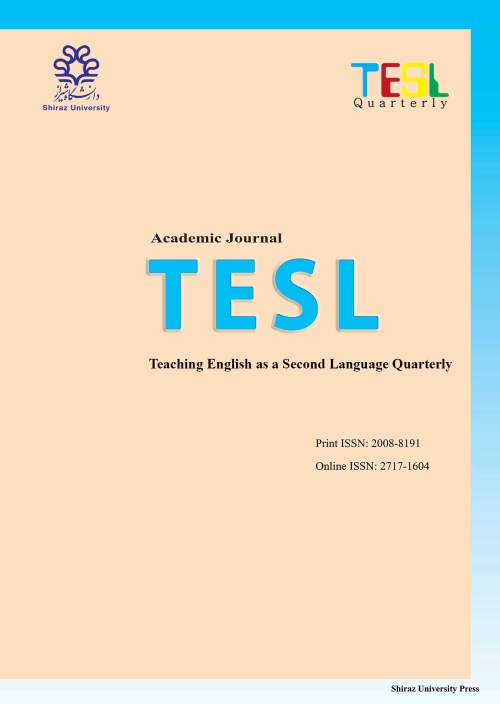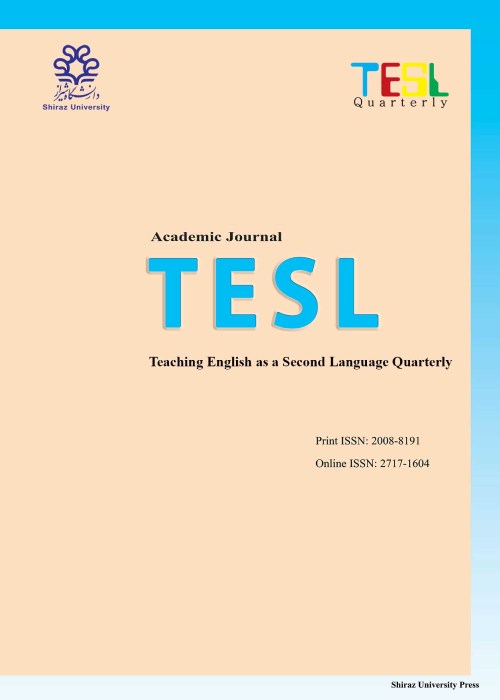فهرست مطالب

Teaching English as a Second Language Quarterly
Volume:41 Issue: 4, Autumn 2022
- تاریخ انتشار: 1401/09/30
- تعداد عناوین: 6
-
-
Pages 1-22A needs analysis (NA) study was carried out to determine how well course objectives and actual classroom activities aligned with the English language needs of learners enrolled in a communicative EFL course in Iran. Brown’s (2016) NA framework was adapted with a focus on the democratic and discrepancy view of NA. A case study design utilizing triangulation of data collection was employed to collect and analyze both quantitative and qualitative data. A questionnaire, classroom observations, and post-observation interviews were among the methods used to collect information from 143 learners and 10 teachers. The questionnaires were quantitatively analyzed using frequency counts, percentages, and one-way repeated measures ANOVA analyses to identify learners'' language needs. The qualitative dimension of the study provided a complete picture of course objectives and classroom activities and tasks. The results of the questionnaire showed that the majority of learners agreed that all general English skills were fundamental to communicating in English and ranked speaking skill, followed by writing, as the most needed skills. Also, a review of course objectives indicated that the learning objectives of the English course aligned with learners’ English language needs. However, according to classroom observations and post-observation interviews, classroom goals were not focused on attaining communicative tasks and activity objectives. In fact, teachers’ teaching objectives did not meet the learners'' communicative needs and were limited to teaching four skills at comprehension, grammatical, and lexical levels. Misalignment between assessment tasks and course objectives was reported as one of the contributing factors.Keywords: Communicative language teaching, Classroom Practice, EFL learners’ needs, CLT, TBLT
-
Pages 23-57Despite being an important category of multimodal tourism discourse, Inflight magazines and their roles in promoting international airlines’ profile and their host country, are mostly under-researched. Therefore, the present study aimed to examine the application of different visual and semiotic strategies regarding social actors' race, age and social class and how people are represented in different international airlines’ inflight magazines. For this purpose, 16 international airlines’ inflight magazine issues were selected depending on the host country's geographical location and availability. Using Kress and van Leeuwen’s (2006 [1996]) and van Leeuwen’s (2008) visual grammar, the data were analyzed based on ideational, interpersonal and compositional levels. The results revealed that inflight magazine designers, content developers and advertisement agencies tend to apply certain visual and semiotic resources. They reinforce bias and false stereotypes towards certain groups of people in terms of their age, race and social class originating in political, historical and ideological perceptions and standpoints of higher institutions across the world. The findings also highlight the importance of visual literacy being promoted to the target audience, including air travelers and EFL learners.Keywords: social actors, In-flight magazines, Social semiotic analysis, discourse analysis, Tourism discourse, Visual Grammar
-
Pages 59-86The design, implementation and outcomes of curriculums must be ongoingly evaluated. Using quantitative gap analysis, this study evaluated Iranian EFL teachers’ satisfaction with their pre-service education in developing their assessment literacy in reference to the perceived importance of knowledge and skills areas of classroom language assessment. To this end, the study included 100 EFL teachers who graduated from state universities in Iran with at least a Bachelor’s degree and three to five years of teaching experience at public schools. Data were collected using a 44-item researcher-made semantic differential Likert scale. It involved two parts tapping into their perceptions of importance and the level of their pre-service preparation. Descriptive analysis and inferential statistics revealed that the teachers rated all the areas almost highly (M ≥ 4.67 out of 6). The participants attached the highest importance to the areas of "assessing different language skills and sub-skills". In contrast, the areas relating to "interpreting students’ test performance” and “making the appropriate decision about the students’ test results and test washback" were perceived to be the least significant in classroom assessment. The gap analysis also indicated that there was a significant difference between the teachers’ perception of the importance of assessment knowledge and skills areas and their level of pre-service education, construed as their under-preparedness for classroom assessment. Further, the gaps were perceived to be sharper in assessment skills areas. The study discusses the implications of the findings in the context of teacher education and classroom assessment in Iran.Keywords: Assessment literacy, Pre-service Curriculum, Gap Analysis, English Teacher, Public Schools
-
Pages 87-112
This study investigated Iranian English as a Foreign Language (EFL) teachers’ remotivational strategies drawing on an integrative framework encompassing Ecological Systems Theory (EST) and Self-Determination Theory (SDT). In this framework, the four EST layers consisting of microsystem, mesosystem, exosystem, and macrosystem and the three related aspects of SDT, including autonomy, relatedness, and competence, were integrated to unravel teachers’ remotivational strategies. The participants included 32 Iranian EFL teachers teaching at six language institutes in Isfahan and Hamedan provinces in Iran. The data were collected via conducting semi-structured interviews. The results of a thematic analysis indicated that Iranian EFL teachers’ remotivational strategies were embedded in the four EST layers consisting of the immediate classroom setting, situations beyond the immediate setting, the linkages and processes taking place between the settings, and the manifestation of a particular subculture. Moreover, the results revealed that teachers’ remotivational strategies were also situated within the three SDT aspects, including autonomy, relatedness, and competence. Overall, the results of thematic analysis led to the emergence of various themes positioned in the four layers of EST, while such themes conceptually fit the three aspects of SDT. The results provide EFL teachers and teacher educators with awareness concerning how remotivational strategies are nested across multiple systems while simultaneously being informed by a certain motivation-specific theory.
Keywords: motivation, remotivation, Remotivational Strategies, EST, SDT -
Pages 113-172This synthesis reviews the methodological issues in empirical studies investigating the effect of working memory capacity (WMC) on relative clause ambiguity resolution where results have failed to be consistent cross-linguistically and even intra-linguistically. This discrepancy might have occurred due to ‘methodological inconsistencies’ in the design (Liu & Brown, 2015), administration, and scoring of WMC measures. This study aimed to investigate the aggregative and developmental status of the methodological practices of WMC measures and describe how transparently such practices have been reported. Based on a comprehensive search, 39 experiments were retrieved from 25 studies, culminating in a collection of studies with a time span of 22 years from 1999 to 2021, and coded for 46 features. Results revealed that although over the past 22 years, the field has witnessed significant improvements in the employment of WMC tests, there are still a lot of variations and inconsistencies calling for attempts to raise methodological awareness among researchers to afford more attention to quality and transparency in reporting WMC tests. The article concludes with a call for reform in standardizing WMC tests and a number of other recommendations for future primary and secondary research.Keywords: methodological awareness, methodological synthesis, methodological transparency, Relative Clause Attachment Ambiguity Resolution, working memory capacity
-
Pages 173-188This review article examines the underpinning of the little-researched, influential elements that create linguistic injustice in the specific contexts of linguistic imperialism through standardization. To this end, with a review of critical views that includes argumentation and discussion of theoretical and empirical studies, we further aim to highlight linguistic injustice in writing for publishing. The domination of the English language as a lingua academia has not happened neutrally and can create unjust and unequal situations. In knowledge construction, the prosperity of researchers and academics is tied to international publication, and this action supports globalization, individualism, and standardization in favor of native English users. The domination of the English language in academic settings may be a hegemonic practice of native Anglophones to maintain power. In this review, we underline the possibilities for privileged communities to pinpoint linguistic inequality and injustice. The nature of academia should be liberal and liberating; however, in reality, academic settings are politically partisan and at the service of the powerful and wealthy. Still, there is slim hope that the system can change, and one of such profound changes may happen with equal access to resources and mentors for marginalized communities. In this case, the minorities’ voices may also be heard and respected globally.Keywords: Injustice, imperialism, standardization, criticality, academic writing


